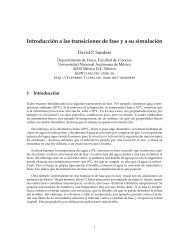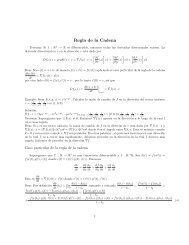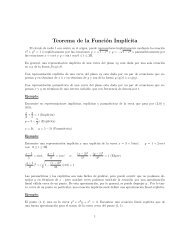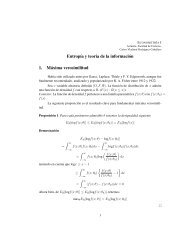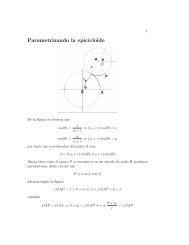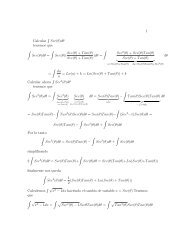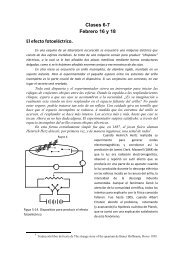"Surely You're Joking, Mr. Feynman!" - unam.
"Surely You're Joking, Mr. Feynman!" - unam.
"Surely You're Joking, Mr. Feynman!" - unam.
You also want an ePaper? Increase the reach of your titles
YUMPU automatically turns print PDFs into web optimized ePapers that Google loves.
y first learning to pronounce the letters, then the words, and then sentences and para<br />
graphs. They can recite, word for word, what Socrates said, without realizing that those<br />
Greek words actually mean something. To the student they are all artificial sounds.<br />
Nobody has ever translated them into words the students can understand.<br />
I said, "That's how it looks to me, when I see you teaching the kids 'science' here<br />
in Brazil." (Big blast, right?)<br />
Then I held up the elementary physics textbook they were using. "There are no<br />
experimental results mentioned anywhere in this book, except in one place where there is<br />
a ball, rolling down an inclined plane, in which it says how far the ball got after one<br />
second, two seconds, three seconds, and so on. The numbers have 'errors' in them that<br />
is, if you look at them, you think you're looking at experimental results, because the<br />
numbers are a little above, or a little below, the theoretical values. The book even talks<br />
about having to correct the experimental errors very fine. The trouble is, when you<br />
calculate the value of the acceleration constant from these values, you get the right<br />
answer. But a ball rolling down an inclined plane, if it is actually done, has an inertia to<br />
get it to turn, and will, if you do the experiment, produce fivesevenths of the right<br />
answer, because of the extra energy needed to go into the rotation of the ball. Therefore<br />
this single example of experimental 'results' is obtained from a fake experiment. Nobody<br />
had rolled such a ball, or they would never have gotten those results!<br />
"I have discovered something else," I continued. "By flipping the pages at<br />
random, and putting my finger in and reading the sentences on that page, I can show you<br />
what's the matter how it's not science, but memorizing, in every circumstance.<br />
Therefore I am brave enough to flip through the pages now, in front of this audience, to<br />
put my finger in, to read, and to show you."<br />
So I did it. Brrrrrrrup I stuck my finger in, and I started to read:<br />
"Triboluminescence. Triboluminescence is the light emitted when crystals are crushed. .<br />
."<br />
I said, "And there, have you got science? No! You have only told what a word<br />
means in terms of other words. You haven't told anything about nature what crystals<br />
produce light when you crush them, why they produce light. Did you see any student go<br />
home and try it? He can't.<br />
"But if, instead, you were to write, 'When you take a lump of sugar and crush it<br />
with a pair of pliers in the dark, you can see a bluish flash. Some other crystals do that<br />
too. Nobody knows why. The phenomenon is called "triboluminescence." ' Then<br />
someone will go home and try it. Then there's an experience of nature." I used that<br />
example to show them, but it didn't make any difference where I would have put my<br />
finger in the book; it was like that everywhere.<br />
Finally, I said that I couldn't see how anyone could be educated by this self<br />
propagating system in which people pass exams, and teach others to pass exams, but<br />
nobody knows anything. "However," I said, "I must be wrong. There were two Students<br />
in my class who did very well, and one of the physicists I know was educated entirely in<br />
Brazil. Thus, it must be possible for some people to work their way through the system,<br />
bad as it is."<br />
Well, after I gave the talk, the head of the science education department got up<br />
and said, "<strong>Mr</strong>. <strong>Feynman</strong> has told us some things that are very hard for us to hear, but it<br />
appears to be that he really loves science, and is sincere in his criticism. Therefore, I



